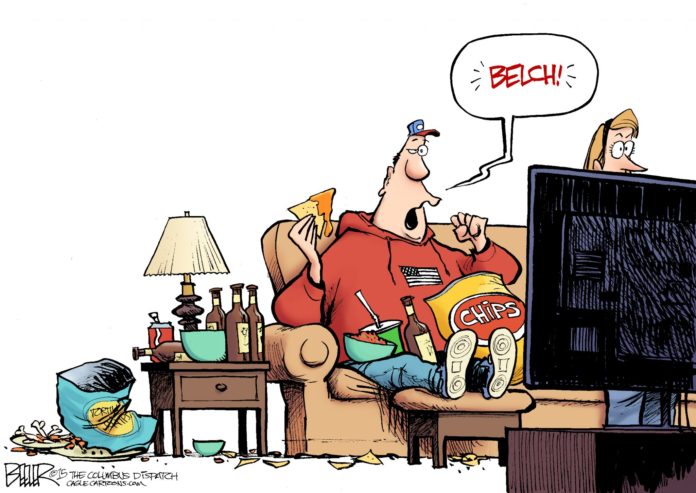BY RALPH NADER
 Make no mistake about it, sports are important.
Make no mistake about it, sports are important.
That’s true if for no other reason than the fact that sports absorb billions of hours of people’s time – at all ages. Whatever you think about sports, they’re clearly important for that reason alone.
Sports are also important because they have become a multibillion-dollar industry, one of the Top 10 biggest industries in the country. According to Plunkett Research, the estimated size of the entire sports industry in 2012 was $435 billion. That makes it much bigger than the U.S. auto industry, movie industry and many others.
Sports are important because professional and big-time college sports basically operate as self-regulated monopolies. That creates problems that filter all the way down to sports at the high school and youth levels.
Finally, sports are important because sports ethos, mentalities and policies impact, in one way or another, virtually all aspects of our society.
While sports started as a form of play, recreation, and fun for family and friends, they have increasingly become commercialized and professionalized spectacles, at all levels [See: Little League World Series]. The result is our games suffer from a general soul sickness, resulting in problems that are zapping the human spirit out of the games we love at their best.
Clearly, sports are worthy of more serious examination than they receive in the United States today.
Nevertheless, controversial sports problems and abuses haven’t received the persistent, timely attention they deserve, including the development of well-conceived remedies for the games’ ills.
Until now.
How We Can Save Sports: A Game Plan, by Dr. Ken Reed a former college athlete, coach, long-time sports marketer, sports management instructor and sports issues columnist, and now sports policy director for our League of Fans [see leagueoffans.org] is unlike any other sports book I’ve seen.
There are plenty of books on the market about each of our most popular sports – football, basketball, baseball, hockey, tennis, golf, etc. There are numerous books that profile our well-known sports figures. And there are a few books on specific sports issues like concussions and taxpayer-financed stadiums and arenas.
But Reed’s book is different. It covers the whole waterfront of sports issues and looks at how they’re all interconnected. It’s basically a sports manifesto that looks at nine of the most important sports issues we face today and the red thread that weaves through them all, from youth sports to the pros.
And what is that red thread?
According to Reed, it’s ego and greed, and the win-at-all-costs [WAAC] and profit-at-all-costs [PAAC] policies and mentalities those vices have spawned throughout the world of sports.
In fact, it is these WAAC and PAAC policies and mentalities that are the foundation of the numerous issues Reed addresses in his book, including: adult-dominated youth sports; the demise of physical education and intramural sports in our schools; militaristic coaches that berate and abuse our young athletes; the lack of adequate concussion safety protocols and return-to-play guidelines throughout sports; a college sports model in which athletes’ economic and civil rights are denied; wealthy pro sports owners who hold taxpayers hostage in order to get publicly-financed sports palaces built; and an ongoing lack of equal opportunity in sports for female, disabled, and LGBT athletes and administrators. The list goes on.
One issue that Reed addresses in his book really hits home with me. He points out the fallacy behind the idea that the United States is a “sports mad country” as many outsiders have called us. In effect, we’re a country that’s mad about spectator sports. Our sports pages should really be renamed “Spectator Sports” because that’s all they cover. They have nothing to do with community participatory sports.
Americans love watching sports, usually while sitting on their couches eating junk food. It’s interesting to note that in a University of Arkansas-Little Rock study, highly identified sports fans had significantly higher health risk behaviors than non-sports fans on a range of health behavior measures, including a higher Body Mass Index [BMI], along with higher fat, fast food and alcohol consumption.
Reed also takes a jab at the sports media. He points out that the media will occasionally identify scandals, and other symptoms of problems in the sports world, but then stop. What’s left missing is a discussion regarding how to mitigate these problems. Also, mostly left out is any reporting of sports reform initiatives and grassroots movements designed to change sport – unless there is a major eruption or scandal that can’t be ignored.
Why? Because sports media corporations, and most sports journalists, have too much invested, economically and psychologically in the current system to push for significant change. As Reed says, the dominant ideology of commercialized and professionalized sport is diffused through corporate entities, including sports media.
Therefore, it’s up to citizens who love sport at its best, to rise up and push for change. Reed labels his call to action “citizenship through sports activism.” He provides would-be sports reformers and activists the analytical foundation, recommendations and resources needed to improve the valuable sports experience for all stakeholders.
He also identifies where people are already fighting for needed change around the country.
That’s good news because sports can be healthy socio-cultural practice of much value when win-at-all-cost and profit-at-all-cost thinking aren’t driving the bus.
Let’s hope that a significant number of sports fans – including concerned parents of young athletes – take Reed’s lead and start debating and discussing these issues in their communities.
It’s time for a grand slam look at the entire sports scene.
Nader.org








